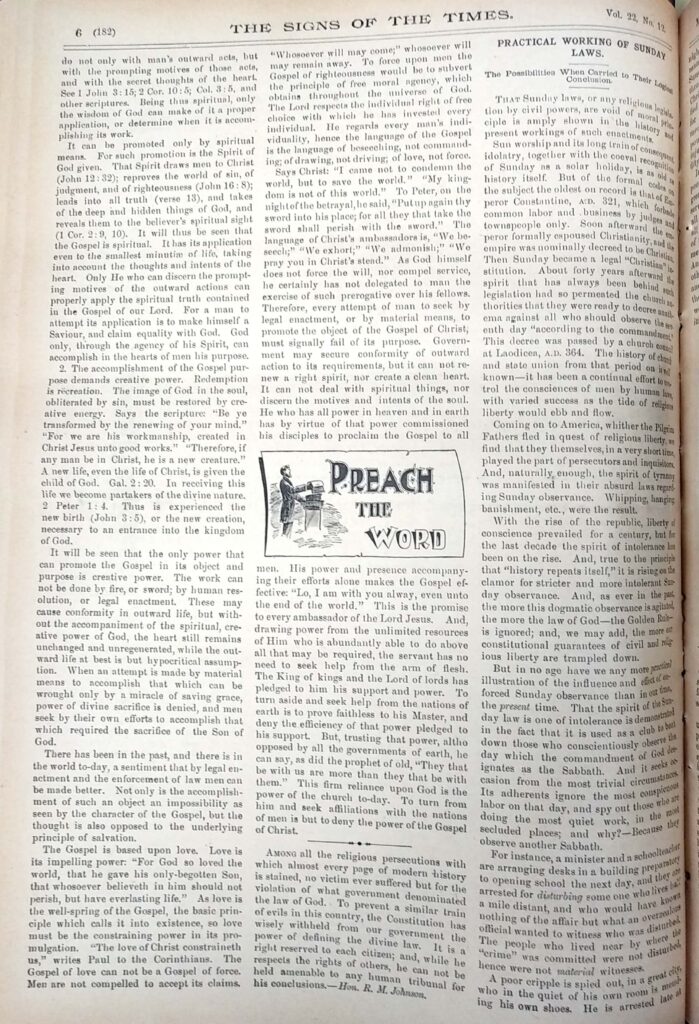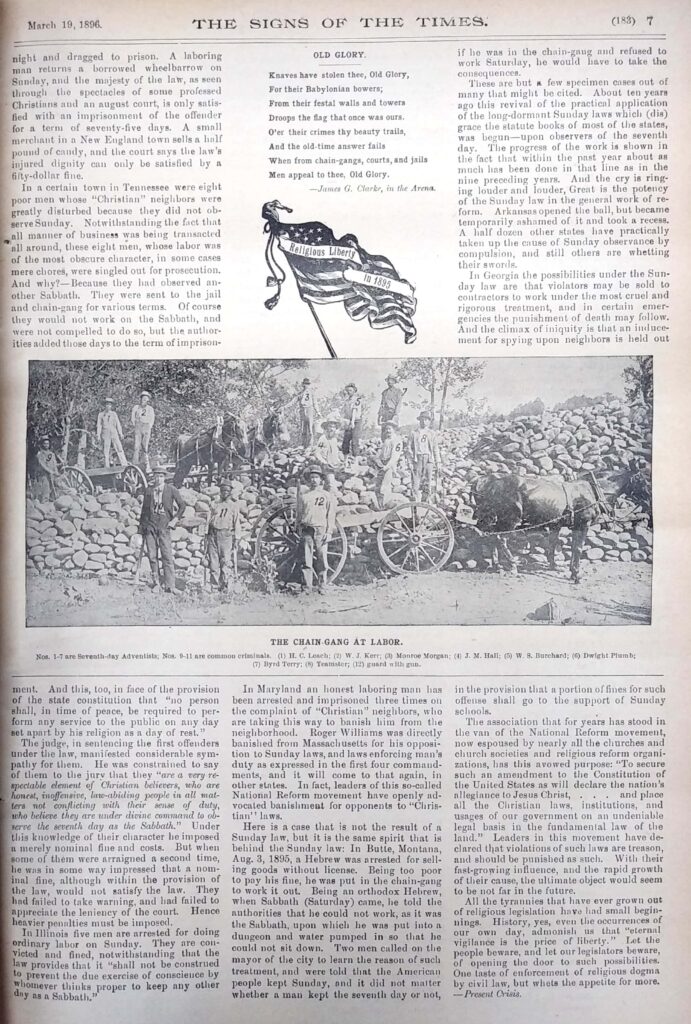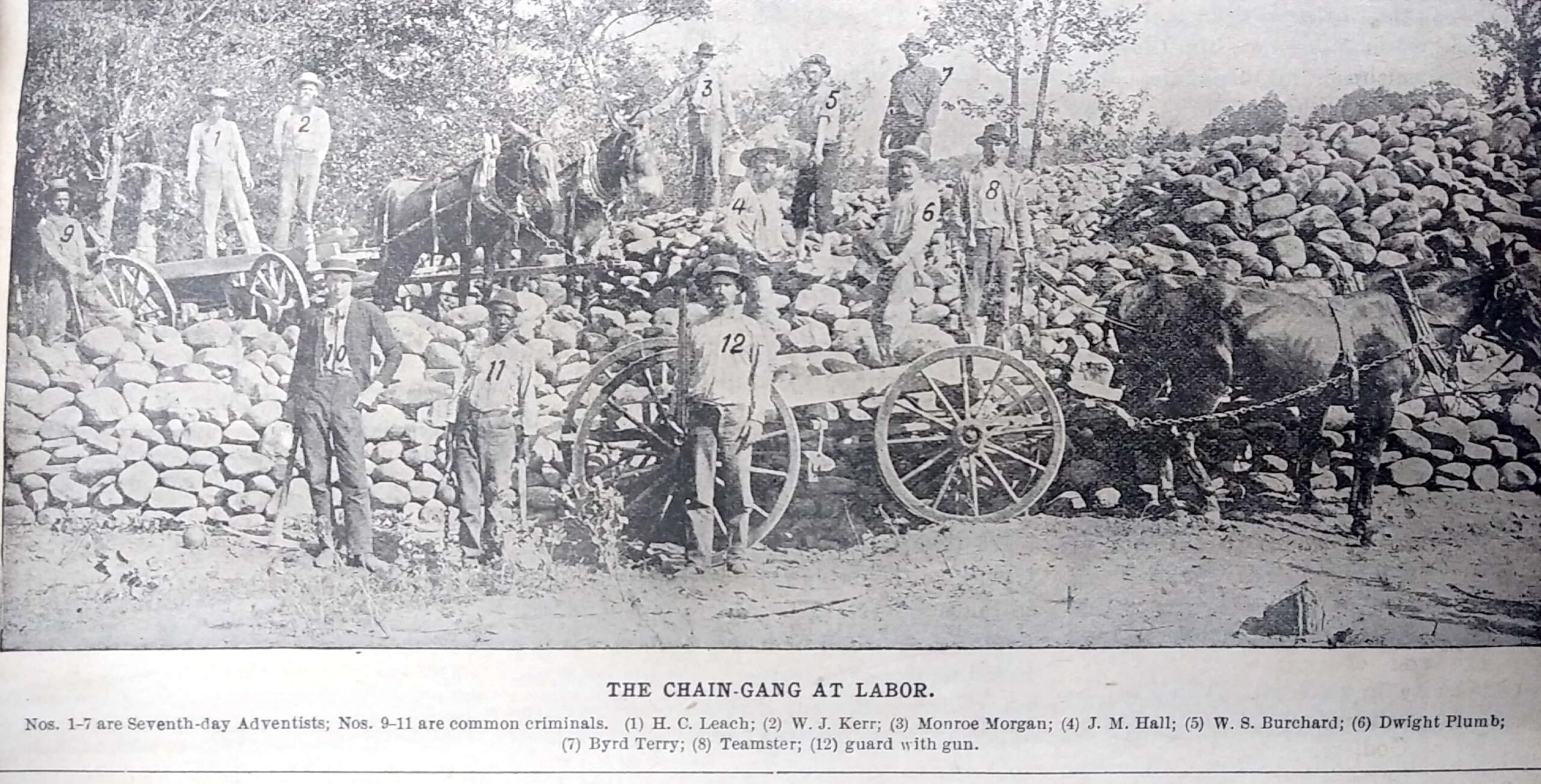Practical Working of Sunday Laws
The Possibilities When Carried to Their Logical Conclusion
THAT Sunday laws, or any religious legislation by civil powers, are void of moral principle is amply shown in the history and present workings of such enactments.
Signs of the Times, March 19, 1896
Sun worship and its long train of consequent idolatry, together with the coeval recognition of Sunday as a solar holiday, is as old as history itself. But of the formal codes on the subject the oldest on record is that of Emperor Constantine, A.D. 321, which forbade common labor and business by judges and townspeople only. Soon afterward the emperor formally espoused Christianity, and the empire was nominally decreed to be Christian. Then Sunday became a legal “Christian” institution. About forty years afterward the spirit that has always been behind such legislation had so permeated the church authorities that they were ready to decree anathema against all who should observe the seventh day “according to the commandment.” This decree was passed by a church council at Laodicea, A.D. 364. The history of church and state union from that period on is well known-it has been a continual effort to control the consciences of men by human laws, with varied success as the tide of religious liberty would ebb and flow.
Coming on to America, whither the Pilgrim Fathers fled in quest of religious liberty, we find that they themselves, in a very short time, played the part of persecutors and inquisitors. And, naturally enough, the spirit of tyranny was manifested in their absurd laws regarding Sunday observance. Whipping, hanging, banishment, etc. were the result.
With the rise of the republic, liberty of conscience prevailed for a century, but for the last decade the spirit of intolerance has been on the rise. And, true to the principle that “history repeats itself,” it is rising on the clamor for stricter and more intolerant Sunday observance. And, as ever in the past, the more this dogmatic observance is agitated, the more the law of God – the Golden Rule – is ignored; and, we may add, the more our constitutional guarantees of civil and religious liberty are trampled down.
But in no age have we any more practical illustration of the influence and effect of enforced Sunday observance than in our time, the present time. That the spirit of the Sunday law is one of intolerance is demonstrated in the fact that it is used as a club to beat down those who conscientiously observe the day which the commandment of God designates as the Sabbath. And it seeks occasion from the most trivial circumstances. Its adherents ignore the more conspicuous labor on that day, and spy out those who are doing the most quiet work, in the most secluded places; and why? – Because they observe another Sabbath.
For instance, a minister and a schoolteacher are arranging desks in a building preparatory to opening school the next day, and they are arrested for disturbing some one who lives half a mile distant, and who would have known nothing of the affair but what an overzealous official wanted to witness who was disturbed. The people who lived near by where the “crime” was committed were not disturbed, hence were not material witnesses.
A poor cripple is spied out, in a great city, who in the quiet of his own room is mending his own shoes. He is arrested late at night and dragged to prison. A laboring man returns a borrowed wheelbarrow on Sunday, and the majesty of the law, as seen through the spectacles of some professed Christians and an august court, is only satisfied with an imprisonment of the offender for a term of seventy-five days. A small merchant in a New England town sells a half pound of candy, and the court says the law’s injured dignity can only be satisfied by a fifty-dollar fine.
In a certain town in Tennessee were eight poor men whose “Christian” neighbors were greatly disturbed because they did not observe Sunday. Notwithstanding the fact that all manner of business was being transacted all around, these eight men, whose labor was of the most obscure character, in some cases mere chores, were singled out for prosecution. And why? – Because they had observed another Sabbath. They were sent to the jail and chain-gang for various terms. Of course they would not work on the Sabbath, and were not compelled to do so, but the authorities added those days to the term of imprisonment. And this, too, in face of the provision of the state constitution that “no person shall, in time of peace, be required to perform any service to the public on any day set apart by his religion as a day of rest.”
The judge, in sentencing the first offenders under the law, manifested considerable sympathy for them. He was constrained to say of them to the jury that they “are a very respectable element of Christian believers, who are honest, inoffensive, law-abiding people in all matters not conflicting with their sense of duty, who believe they are under divine command to observe the seventh day as the Sabbath.” Under this knowledge of their character he imposed a merely nominal fine and costs. But when some of them were arraigned a second time, he was in some way impressed that a nominal fine, although within the provision of the law, would not satisfy the law. They had failed to take warning, and had failed to appreciate the leniency of the court. Hence heavier penalties must be imposed.
In Illinois five men are arrested for doing ordinary labor on Sunday. They are convicted and fined, notwithstanding that the law provides that it “shall not be construed to prevent the due exercise of conscience by whomever thinks proper to keep any other day as a Sabbath.”
In Maryland an honest laboring man has been arrested and prisoned three times on the complaint of “Christian” neighbors, who are taking this way to banish him from the neighborhood. Roger Williams was directly banished from Massachusetts for his opposition to Sunday laws, and laws enforcing man’s duty as expressed in the first four commandments, and it will come to that again, in other states. In fact, leaders of this so-called National Reform movement have openly advocated banishment for opponents to “Christian” laws.
Here is a case that is not the result of a Sunday law, but it is the same spirit that is behind the Sunday law: In Butte, Montana, Aug. 3, 1895, a Hebrew was arrested for selling goods without a license. Being too poor to pay his fine, he was put in the chain-gang to work it out. Being an orthodox Hebrew, when Sabbath (Saturday) came, he told the authorities that he could not work, as it was the Sabbath, upon which he was put into a dungeon and water pumped in so that he could not sit down. Two men called on the mayor of the city to learn the reason of such treatment, and were told that the American people kept Sunday, and it did not matter whether a man kept the seventh day or not, if he was in the chain-gang and refused to work Saturday, he would have to take the consequences.
These are but a few specimen cases out of many that might be cited. About ten years ago this revival of the practical application of the long-dormant Sunday laws which (dis)grace the statute books of most of the states, was begun – upon observers of the seventh day. The progress of the work is shown in the fact that within the past year about as much has been done in that line as in the nine preceding years. And the cry is ringing louder and louder, Great is the potency of the Sunday law in the general work of reform. Arkansas opened the ball, but became temporarily ashamed of it and took a recess. A half dozen other states have practically taken up the cause of Sunday observance by compulsion, and still others are whetting their swords.
In Georgia the possibilities under the Sunday law are that violators may be sold to contractors to work under the most cruel and rigorous treatment, and in certain emergencies the punishment of death may follow. And the climax of iniquity is that an inducement for spying upon neighbors is held out in the provision that a portion of fines for such offense shall go to the support of Sunday schools.
The association that for years has stood in the van of the National Reform movement, now espoused by nearly all the churches and church societies and religious reform organizations, has this avowed purpose: “To secure such an amendment to the Constitution of the United States as will declare this nation’s allegiance to Jesus Christ, . . . and place all the Christian laws, institutions, and usages of our government on an undeniable legal basis in the fundamental law of the land.” Leaders in this movement have declared that violations of such laws are treason, and should be punished as such. With their fast-growing influence, and the rapid growth of their cause, the ultimate object would seem to be not far in the future.
All the tyrannies that have ever grown out of religious legislation have had small beginnings. History, yes, even the occurrences of our own day, admonish us that “eternal vigilance is the price of liberty.” Let the people beware, and let our legislators beware, of opening the door to such possibilities. One taste of enforcement of religious dogma by civil law, but whets the appetite for more.
“One of the marked features in the representation of the 144,000 is that in their mouth was found no guile. The Lord has said, “Blessed is the man … in whose spirit there is no guile” [Psalm 32:2]. They profess to be children of God, and are represented following the Lamb whithersoever He goeth. They are prefigured before us as standing on Mount Zion, girt for holy service, clothed in white linen, which is the righteousness of the saints. But all who follow the Lamb in heaven will first have followed Him on earth, in trustful, loving, willing obedience; followed Him not fretfully and capriciously, but confidently, truthfully, as the flock follows the shepherd.
Are these the ones who are bruising and imprisoning their fellow men, humiliating them to the depraved association of those who compose the chain gang? Is this the sign of those who follow the Lamb? No, no. All who do this work evidence that they have chosen the side of one who was expelled from Eden, who was a falsifier of God, and who by oppression tries to compel God’s chosen ones to worship an idol sabbath which is without one text of Scripture for its authority.
Did Christ give His followers any such lesson or example? No; He came, not to break down the moral power of men, but to restore it. He came to break the power of oppression. His work was to release those who were in bondage to Satan. Those who say, I am a child of God, and yet do work which will grieve and oppress, executing cruel actions against their fellow men, are not following the Lamb whithersoever He goeth, but are followers of another leader. They develop the attributes of Satan, and make it manifest that they are participators and co-workers with him to bind, imprison, and condemn, to cause all the suffering possible to body and mind, because they cannot compel men to be untrue to God and dishonor His work and transgress His holy law.
These are the ones who have guile in their mouths. These are the ones that profess to be followers of Christ while they are following a leader who was expelled from the courts of heaven. These men, who are working unrighteousness with such zealous zeal, show before the whole world and universe that if Christ was upon the earth, as at His first advent, they would do as did the unbelieving Jews—follow Him as spies, seeking to get Him to say something which they could use against Him to condemn Him to death. If they had opportunity and power, they would do as did Nebuchadnezzar when he set up his golden image in the plains of Dura.”
Ellen G. White, Manuscript 7a, 1896; 14MR 93, 94
“During 1895 and 1896, no less than seventh-six Seventh-day Adventists were prosecuted in the United States and Canada for existing Sunday laws. Of these, twenty-eight served terms of various lengths in jails, chain-gang, etc., aggregating 1,144 days, or nearly three and one-half years for a single person.”
American State Papers Bearing on Sunday Laws, p. 726



